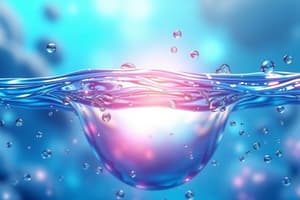Podcast
Questions and Answers
What charge do protons have in an atom?
What charge do protons have in an atom?
- Negative
- Positive (correct)
- Neutral
- Variable
Which type of bond is formed between a hydrogen atom with a partial positive charge and another atom with a partial negative charge?
Which type of bond is formed between a hydrogen atom with a partial positive charge and another atom with a partial negative charge?
- Metallic bond
- Ionic bond
- Covalent bond
- Hydrogen bond (correct)
In terms of molecular structure, what feature makes water a polar molecule?
In terms of molecular structure, what feature makes water a polar molecule?
- Presence of ionic bonds
- Equal sharing of electrons
- Unbalanced charge distribution (correct)
- Highly symmetrical shape
How many protons does oxygen have in its nucleus?
How many protons does oxygen have in its nucleus?
What characteristic of water contributes to its high heat capacity?
What characteristic of water contributes to its high heat capacity?
What characteristic of a water molecule contributes to its polarity?
What characteristic of a water molecule contributes to its polarity?
Which property of water allows small insects to walk on its surface without sinking?
Which property of water allows small insects to walk on its surface without sinking?
Why do water molecules rise higher in narrower tubes?
Why do water molecules rise higher in narrower tubes?
What is the term used to describe the attraction between molecules of the same substance in water?
What is the term used to describe the attraction between molecules of the same substance in water?
How does the unique structure of water contribute to its high heat capacity?
How does the unique structure of water contribute to its high heat capacity?
Flashcards are hidden until you start studying
Study Notes
The Water Molecule
- Water is a polar molecule
- Oxygen has a stronger pull on electrons than hydrogen
- This causes a partial negative charge near the oxygen atom and a partial positive charge near the hydrogen atoms
Hydrogen Bonding
- Hydrogen bonds form between a hydrogen atom with a partial positive charge and another atom with a partial negative charge
- These bonds are weaker than covalent bonds but are important for water's properties
Special Properties of Water
- Cohesion: attraction between molecules of the same substance
- Adhesion: attraction between molecules of different substances
- Heat capacity: the amount of heat needed to raise the temperature of a substance by 1 degree Celsius
- Surface tension: a measure of the force required to break the surface of a liquid
Cohesion
- The strong attraction between water molecules results in surface tension
- This allows very lightweight objects, such as spiders, to float on the surface of water
Adhesion
- Water molecules rise higher in narrow tubes because more of the water's surface is adhering to the glass
- The adhesion between water and glass is stronger than the cohesion between water molecules, pulling the water upwards
Heat Capacity
- Water has a high heat capacity
- This means that it takes a lot of energy to raise the temperature of water
- This property is important for regulating the temperature of living organisms
Solutions
- A solution is a type of mixture in which all components are evenly distributed
- The substance that is dissolved is called the solute
- The substance in which the solute dissolves is called the solvent
A Salt Solution
- When salt (NaCl) dissolves in water, its ions break apart and move throughout the water
- This is why the salt seems to disappear
- The Cl- ions bind with the hydrogens (+) of water, while the Na+ ions bind with the oxygen (-) of water
- This is possible because of water's polarity
Suspensions
- Suspensions are mixtures of water and nondissolved material
- The material in a suspension is not evenly distributed
Acids, Bases, and pH
- pH is a measure of hydrogen ion (H+) concentration
- A low pH indicates a higher concentration of H+ and is acidic
- A high pH indicates a lower concentration of H+ and is basic
- Pure water has a neutral pH
- The hydrogen ion concentration for stomach acid is higher than pure water
- The hydrogen ion concentration for bleach is lower than pure water
Buffers
- Buffers are substances that resist changes in pH
- They do this by accepting or donating H+ ions
- Buffers are important for maintaining the pH of living organisms
Studying That Suits You
Use AI to generate personalized quizzes and flashcards to suit your learning preferences.




